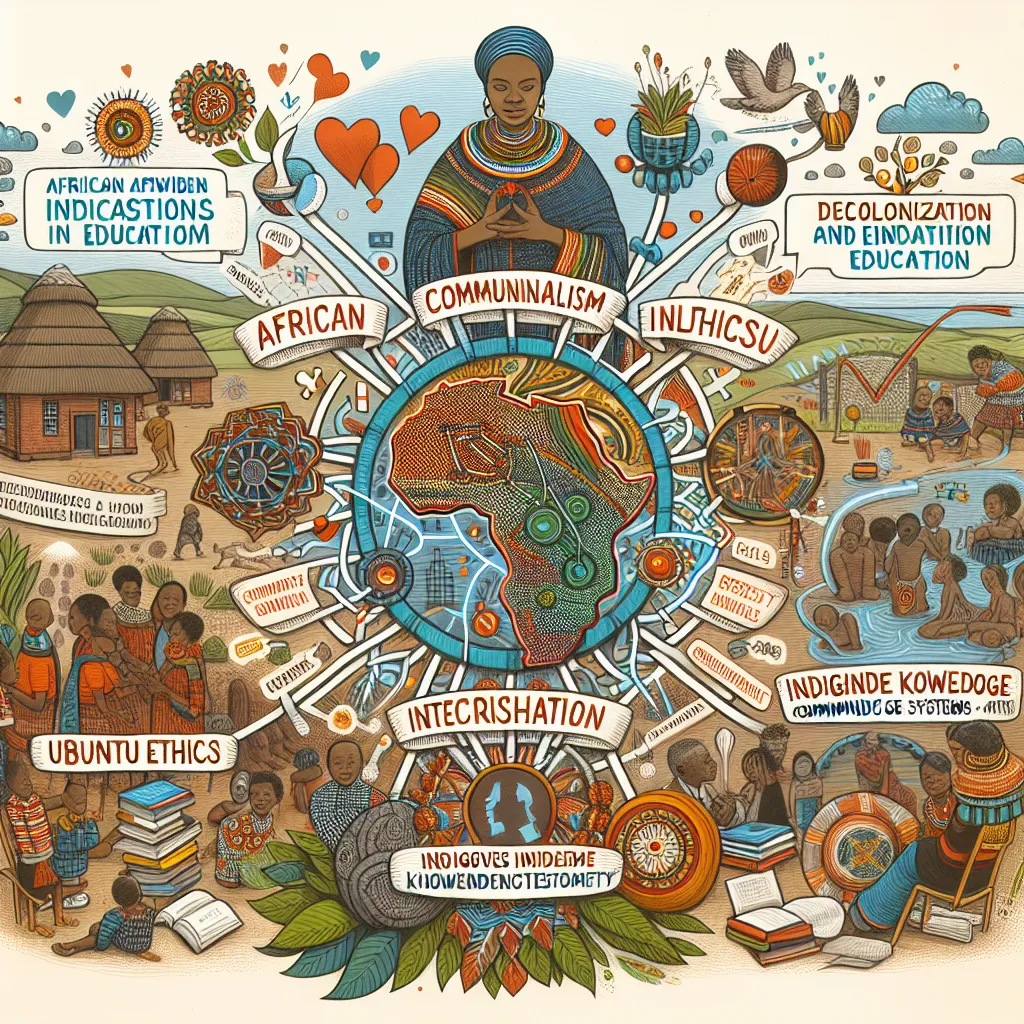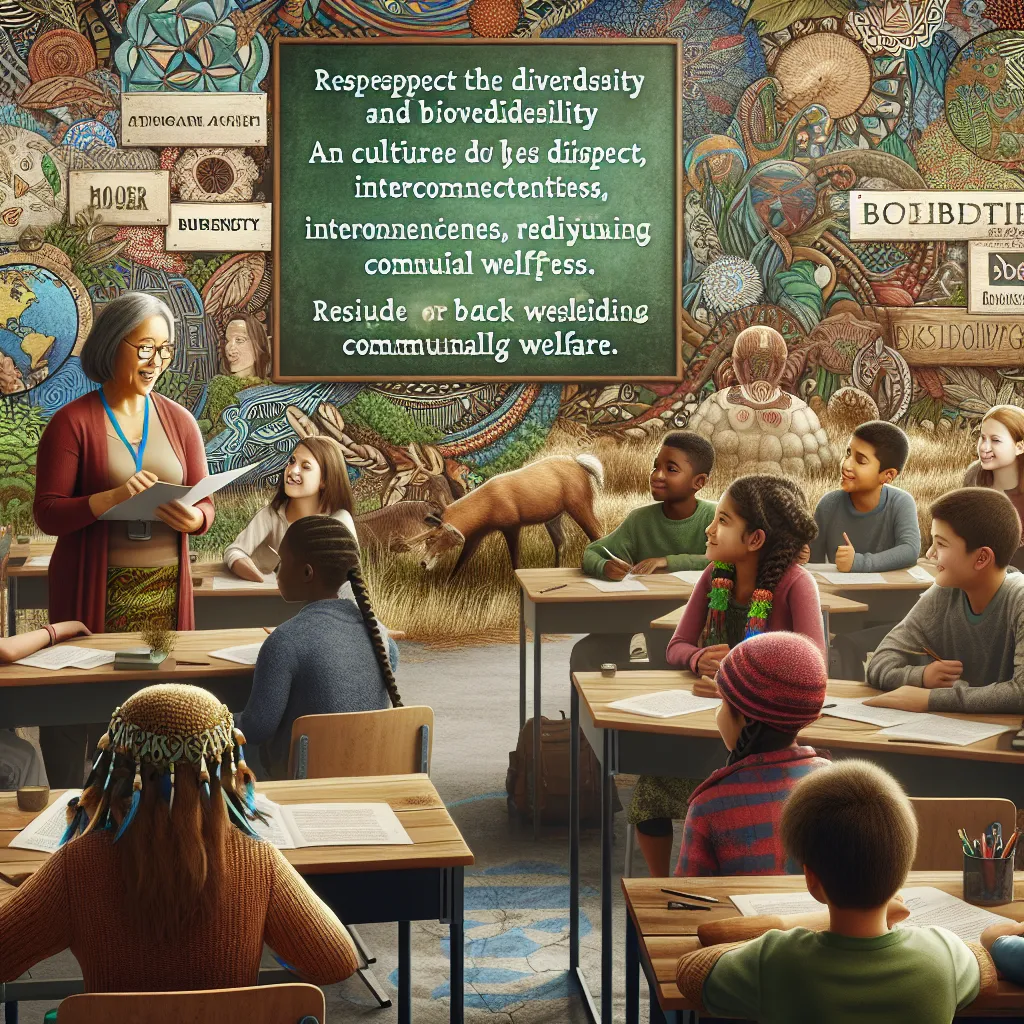Ask AI on The Internet
Question: 7.2.1 Discuss the following concepts: Decolonisation, African communalism, Ubuntu, and Indigenous Knowledge Systems (IKS) and explain how an African Philosophy influences your teaching context. Provide examples. (20 marks) #### a) Decolonisation (Education) **Explanation:** Decolonisation in education means reshaping the education system to integrate indigenous knowledge and perspectives alongside Western methods, making it more relevant to local contexts. **Example:** When teaching history, include African historical figures and events as major components of the curriculum, alongside traditional Western topics, to provide a balanced perspective. #### b) African communalism **Explanation:** African communalism emphasizes the importance of community and relationships, viewing individuals as interconnected within their community. **Example:** In a classroom setting, encourage group projects and peer-to-peer learning to foster a sense of community and interdependence among students. #### c) Ubuntu (Humanness) **Explanation:** Ubuntu is a philosophy that underscores the importance of ethical behavior, caring, and dignity, promoting the well-being and humanity of everyone in the community. **Example:** Implement classroom rules that respect everyone's voice and create a safe, caring environment where students support one another. #### d) Indigenous Knowledge Systems (IKS) **Explanation:** IKS refers to traditional knowledge and practices that evolve over time within a community and are passed down through generations. **Example:** Incorporate local customs and traditional knowledge into science lessons, such as using local medicinal plants to explain biological concepts. **Influence of African Philosophy on Teaching Context:** African philosophy ensures that education is relevant, communal, and ethical, enhancing the learning experience by including various cultural perspectives. For instance, using a curriculum that reflects Ubuntu and communal learning helps students appreciate their cultural heritage, learn through collaboration, and develop a stronger ethical foundation. ### 7.3 The Concept of Teaching and Learning #### a) The meaning of teaching **Explanation:** Teaching is the process of imparting knowledge, skills, and values to learners, guiding them to understand and apply what they have learned in practical, real-world contexts. #### b) What does teaching involve? **Explanation:** Teaching involves planning lessons, delivering content, assessing student understanding, providing feedback, and creating an engaging learning environment that meets diverse student needs. #### c) My role as a teacher **Explanation:** My role as a teacher is to facilitate learning by providing accurate information, encouraging critical thinking, supporting students emotionally and academically, and preparing them for future challenges. #### d) The meaning of learning **Explanation:** Learning is the process of acquiring new knowledge, skills, attitudes, and values through experience, study, or instruction, leading to a transformation in behavior and understanding. #### e) What does learning involve? **Explanation:** Learning involves active engagement with content, practice through various activities, reflection on experiences, and the application of new knowledge to solve problems or make decisions. ### 7.4 My Teaching Philosophy (Beliefs) #### a) What motivated you to be a teacher? **Explanation:** My passion for helping others and my desire to contribute to society by empowering the next generation motivated me to become a teacher. #### b) Which subject of specialization did you choose and why? **Explanation:** I chose to specialize in [Subject] because it has always fascinated me and I believe it has the potential to profoundly impact students' understanding and appreciation of the world. #### c) How do you believe learners learn best? **Explanation:** I believe learners learn best in an environment that is supportive, engaging, and experiential, where they can actively participate, collaborate with peers, and see the relevance of their studies to real life. #### d) Do you believe teaching is a vital profession? Why? **Explanation:** Yes, teaching is a vital profession because it shapes the future by educating and mentoring the youth, instilling in them the knowledge, skills, and values necessary to become responsible and capable citizens. **Overall, my teaching philosophy is built on the principles of decolonisation, African communalism, Ubuntu, and Indigenous Knowledge Systems, ensuring that education is holistic, inclusive, and relevant to my students' lives.** make all the definitions longer
### 7.2.1 Discuss the following concepts: Decolonisation, African communalism, Ubuntu, and Indigenous Knowledge Systems (IKS) and explain how an African Philosophy influences your teaching context. Provide examples. (20 marks) #### a) Decolonisation (Education) **Explanation:** Decolonisation in education refers to the process of challenging and dismantling the dominance of colonial perspectives and knowledge systems that have historically marginalized and undervalued indigenous knowledge and ways of knowing. It involves reshaping the educational curriculum and methodologies to be more inclusive of diverse cultural perspectives, particularly those of indigenous peoples. This process seeks to rectify historical imbalances by integrating indigenous epistemologies, histories, languages, and values alongside Western methods. Decolonisation in education aims to make the educational content and experiences more relevant and contextual to the local population, thereby fostering a more equitable and inclusive learning environment. **Example:** In teaching history, a decolonised approach would ensure that the curriculum includes significant African historical figures, events, and movements. Instead of focusing solely on European history or portraying Africa through a colonial lens, the course would highlight African achievements, pre-colonial civilizations, resistance to colonization, and the contributions of African leaders and intellectuals. This balanced perspective not only enriches students' understanding of history but also instills pride in their heritage. #### b) African Communalism **Explanation:** African communalism is a philosophy that highlights the importance of community and collective well-being over individualism. It views individuals as inherently interconnected within their community, where the success and welfare of one person are intertwined with that of the community. This interdependence fosters solidarity, mutual support, and shared responsibility. In an educational context, African communalism encourages collaborative learning, where students work together, share knowledge, and support each other’s academic and personal growth. The emphasis on relationships and community nurtures a supportive and inclusive learning environment. **Example:** In a classroom setting, an educator embracing African communalism might design more group projects and activities that require students to work together towards common goals. For instance, in a science class, students could engage in group experiments where each member contributes to the research, analysis, and presentation of results. This collaborative approach mirrors the communal values, promoting teamwork, respect for others' ideas, and a sense of belonging. #### c) Ubuntu (Humanness) **Explanation:** Ubuntu is an African philosophy that underscores the significance of human relationships and ethical conduct. The term is often translated as "I am because we are," highlighting the belief that a person's humanity is affirmed through their interactions with others. Ubuntu advocates for compassion, dignity, respect, and mutual care, promoting the well-being and humanity of everyone in the community. In an educational environment, fostering Ubuntu means creating a culture where empathy, kindness, and mutual respect are central. It encourages students to support each other and to value everyone's contributions, fostering a sense of unity and shared humanity. **Example:** Implementing Ubuntu in the classroom might involve establishing norms that respect every student’s voice and creating an environment where students feel safe and valued. For example, during class discussions, the teacher can encourage students to listen actively and respond thoughtfully to their peers' perspectives. Additionally, incorporating activities like peer mentoring or group reflections can promote a supportive community, helping students develop strong interpersonal skills and a deep sense of empathy. #### d) Indigenous Knowledge Systems (IKS) **Explanation:** Indigenous Knowledge Systems (IKS) encompass the knowledge, skills, practices, and cultural values that are developed and sustained by indigenous communities over generations. This body of knowledge is often closely tied to the natural environment and is transmitted orally through cultural practices, rituals, and community activities. IKS includes an understanding of agriculture, medicine, ecology, cosmology, and social organization, reflecting a deep connection to the land and community. In education, incorporating IKS means valuing and integrating these traditional ways of knowing into the curriculum, alongside scientific and academic knowledge, to provide a holistic view of the world. **Example:** In science education, integrating IKS might involve teaching students about local medicinal plants and their uses according to indigenous practices alongside Western medical knowledge. For instance, a biology lesson could explore how certain plants used in traditional healers' remedies have been scientifically validated for their medicinal properties. This integration not only validates indigenous knowledge but also enriches students' understanding and fosters respect for cultural diversity. ### Influence of African Philosophy on Teaching Context: African philosophy significantly shapes the educational environment by promoting values of inclusivity, community, and respect for diversity. Incorporating principles like decolonisation, African communalism, Ubuntu, and Indigenous Knowledge Systems ensures that education is relevant, ethical, and reflective of students' cultural backgrounds. **Example:** In practice, a teaching approach influenced by African philosophy might involve using a curriculum that incorporates local histories, languages, and cultural practices. This ensures that students see their heritage represented and respected in their learning materials. Additionally, promoting group work and peer learning reflects the communal nature of African societies, while fostering an environment of empathy and mutual support mirrors the principles of Ubuntu. For instance, a literature teacher might include African authors and oral storytelling traditions, encouraging students to explore and value their cultural narratives. This not only enhances students' educational experience but also helps them develop a stronger sense of identity and ethical responsibility. ### 7.3 The Concept of Teaching and Learning #### a) The Meaning of Teaching **Explanation:** Teaching is a dynamic and purposeful process aimed at facilitating learning, where educators guide students in acquiring knowledge, skills, attitudes, and values. It involves more than just delivering content; teaching is about creating an environment that stimulates curiosity, critical thinking, and the application of learned concepts. Effective teaching is adaptive, responsive to students' needs and backgrounds, and focused on helping learners connect theoretical knowledge to real-world contexts, thus preparing them for future challenges and opportunities. #### b) What Does Teaching Involve? **Explanation:** Teaching involves a multifaceted approach that includes planning and designing instructional materials, delivering lessons, assessing student understanding, and providing constructive feedback. It requires creating an engaging and supportive learning environment that caters to diverse learning styles and needs. Teachers also play a critical role in fostering a positive classroom culture, encouraging active participation, and facilitating meaningful interactions among students. Additionally, teaching involves continuous reflection and professional development to improve instructional practices and stay current with educational advancements. #### c) My Role as a Teacher **Explanation:** My role as a teacher is to be a facilitator of learning, creating opportunities for students to explore, question, and engage with content. I strive to provide accurate and relevant information, encourage critical thinking, and nurture students' intellectual and emotional growth. Beyond academic instruction, I aim to support students' holistic development by fostering a safe and inclusive environment where they feel valued and empowered. My goal is to prepare students to navigate and contribute positively to a complex and rapidly changing world. #### d) The Meaning of Learning **Explanation:** Learning is a comprehensive and transformative process in which individuals acquire new knowledge, skills, attitudes, and values through experiences, instruction, and study. It is characterized by active engagement, reflection, and the ability to apply new understandings in various contexts. Learning leads to changes in behavior, perspectives, and abilities, enabling individuals to adapt to new situations, solve problems, and make informed decisions. It is an ongoing journey of growth and development, both intellectually and personally. #### e) What Does Learning Involve? **Explanation:** Learning involves several interconnected processes, including active engagement with content, practice through various activities, and reflection on personal experiences. It requires motivation, concentration, and the willingness to challenge oneself. Effective learning is often collaborative, involving interactions with teachers, peers, and the broader community. It also includes the application of new knowledge to real-life situations, reinforcing the relevance and utility of what has been learned. Assessments and feedback play crucial roles in the learning process, helping learners identify strengths, address areas for improvement, and track their progress. ### 7.4 My Teaching Philosophy (Beliefs) #### a) What Motivated You to Be a Teacher? **Explanation:** My motivation to become a teacher stems from a deep passion for helping others and a desire to make a meaningful impact on society. I am driven by the opportunity to empower the next generation through education, inspiring them to reach their full potential and become responsible, informed citizens. The ability to foster curiosity, ignite a love for learning, and contribute to the holistic development of young minds is a profoundly rewarding experience that fuels my dedication to teaching. #### b) Which Subject of Specialization Did You Choose and Why? **Explanation:** I chose to specialize in [Subject] because it has always captivated my interest and I believe it holds significant potential to influence students' understanding and appreciation of the world. [Subject] encompasses critical concepts and skills that are essential for students' intellectual and personal growth, and I am passionate about exploring its complexities and sharing that enthusiasm with my students. By specializing in this subject, I aim to inspire a similar fascination and foster a deeper comprehension in my learners. #### c) How Do You Believe Learners Learn Best? **Explanation:** I believe learners learn best in an environment that is supportive, engaging, and experiential. When students feel safe, valued, and understood, they are more likely to take intellectual risks and engage deeply with the content. Active participation, hands-on activities, and collaborative learning opportunities allow students to construct knowledge meaningfully. Additionally, connecting learning to real-life scenarios and encouraging critical thinking helps students see the relevance of their studies, making the learning experience more impactful and enduring. #### d) Do You Believe Teaching Is a Vital Profession? Why? **Explanation:** Yes, teaching is an incredibly vital profession because it shapes the future by educating and mentoring the youth. Teachers play a crucial role in developing students' intellectual, emotional, and social capacities, equipping them with the knowledge, skills, and values necessary to navigate and contribute positively to society. The impact of effective teaching extends beyond the classroom, influencing students' lifelong learning journeys and their ability to address complex challenges, foster innovation, and drive progress in various fields. ### Overall Teaching Philosophy **Explanation:** My overall teaching philosophy is anchored in principles of decolonisation, African communalism, Ubuntu, and Indigenous Knowledge Systems. By embracing these values, I aim to create an educational experience that is holistic, inclusive, and relevant to the lives of my students. Decolonisation ensures that the curriculum respects and reflects cultural diversity, African communalism promotes collaboration and mutual support, while Ubuntu fosters a compassionate and respectful classroom environment. By incorporating Indigenous Knowledge Systems, I validate and enrich students' learning with culturally rooted perspectives. This approach nurtures well-rounded individuals who are proud of their heritage, equipped to work collaboratively, and committed to ethical and communal values. The integration of these principles makes education not just a means to academic success, but a transformative process that prepares students to engage thoughtfully and responsibly with the world.
Think your answer is better than the AI's? Post it below.
Question Tags
If you want your question answered by an AI, click here.







Post your own comment: